SEO for recruitment agencies: 10 steps to smash your competition

The recruitment agency space is hyper competitive...
... and to stay ahead of the game in 2023, your website needs to be found by the right candidates and clients. Google is intent on helping candidates find the jobs they are looking for fast, and the time you have to capture a new client’s attention online is limited. The solution is simple - your website needs good SEO to outrank your rivals.
Our experience with SEO for recruiters spans many years and countless agencies. We’ve seen a thing or two working for recruitment agencies, and we’re keen to show you under the hood!
An SEO guide for recruiters - what is SEO and how can it help your recruitment website?
SEO, or search engine optimisation, is the process of optimising your website so sites like Google, Bing and Duck Duck Go can show it in search results. The more ‘optimised’ your site, the higher your chances of being listed when a candidate or client searches for recruitment or jobs on search engine results pages (SERPs).
But optimising your site for SEO recruitment is an art form, and there are many ways to approach it. In this guide, we start by showing you some real-life case studies of recruitment agencies we have worked with. One of our recruitment clients had website traffic of 61 visitors a month, and after the first month of working with us, that had increased to 1305!
Once you’ve seen the results, we’ll list the top actions you can take to start beating the competition.
But first, what is SEO?
SEO explained for recruiters
SEO takes shape in three forms - on-page SEO, off-page SEO, and technical SEO.
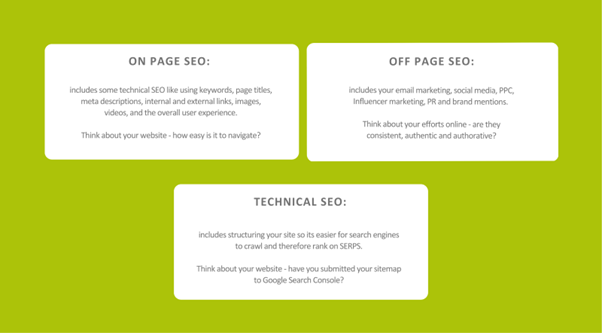
Case studies for recruitment agencies
At Angelfish Marketing, we know how to produce real-time results for clients, we’ve been doing it consistently for a long time.
The following case studies should provide some insight into the type of results you can get by implementing SEO on your recruitment agency website. These are all recruitment agencies that improved their search results when implementing our methods.
Financial Services Recruitment Agency
In January, this financial services recruitment agency was ranking for just 394 ranking keywords. We started our work implementing the methods we're talking about in this guide, and by November, the website was ranking for over 1000 keywords – a staggering 176% increase in ranking keywords on Google!
This had an enormous impact on the number of visitors to the recruitment agency’s website. Over the same period, where they’d started at 370 organic visits per month in January, they rose to 3084 by November 2019 – an incredible 733% increase in search engine traffic to their website!

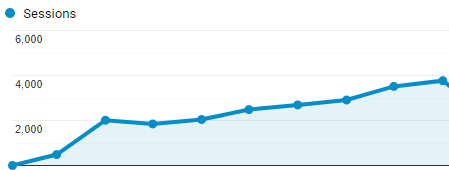
Please note: None of the figures include the significant proportionate increases in direct traffic in all cases.
Engineering Recruitment Agency
The month before Angelfish’s inbound campaigns were implemented, this recruitment agency client’s website was registering at 61 organic sessions.
However, just one month in, this shot up to 1,305 sessions and continued to stay on that level over the coming months, peaking again in July at 1,482 organic sessions:
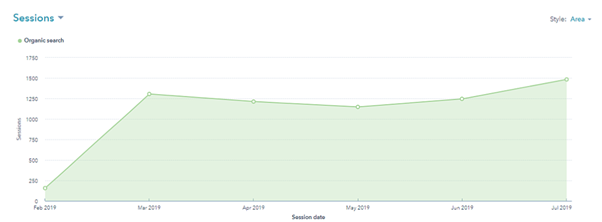
This increase in organic traffic was due to our on-page SEO, technical SEO, and content strategy – all of which helped to raise their search visibility.
Prior to working with us, our client was ranking for just 16 keywords. By month five, we’d helped them increase this to over 198 ranking target keywords!

This had an enormous impact on the number of candidate enquiries the agency was attracting from its organic search engine traffic.
Here you can see how organic searches became the leading source of candidates:
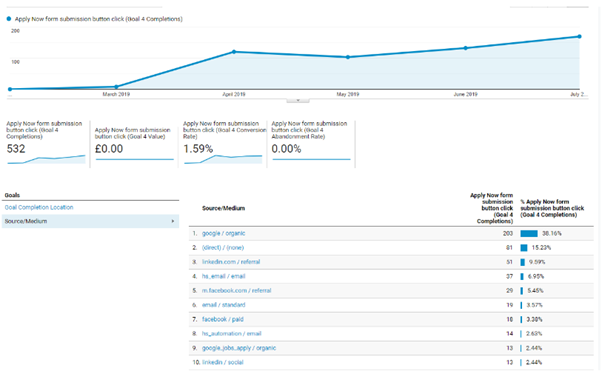
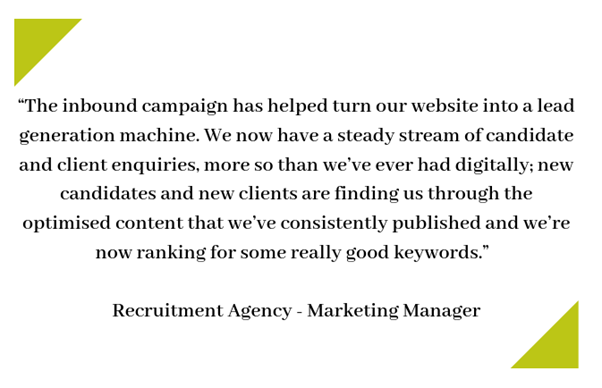
So, how do I implement SEO on my recruitment website?
The following guide provides step-by-step instructions on how to implement SEO on your own website. We know these methods work; we’ve proved it time and time again. All you need to do is implement them on your website to see results. In the meantime, if you want our help or guidance to get these results fast, book a free SEO audit of your site with our team now.
1. Carry out keyword research
A keyword is a word, phrase, or query that someone types into a search engine like Google to find the information they are looking for, and keyword research is the process of identifying the keywords that your prospective clients will look for to find your website.
With these keywords, you can then start building content around what your candidates want to read and subsequently boost the level of traffic coming to your website.
Useful resources:
- What are keywords & how do they impact your inbound marketing?
- How to Approach Keyword Research for Inbound Marketing
2. Create Topic Clusters
Using the Topic Cluster model is vital for good SEO. Topic Clusters work by creating a Pillar page on your subject knowledge. Then ‘clusters’ of related content, like blogs and service pages are centred around that key topic, hyper-focussed on the problem your service solves.

Imagine a site that not only answers the question a candidate came there for but also provides answers to questions they needed to know but hadn’t thought to ask. By strategically organising your content and internally linking related content pages, you build subject authority with search engines and visitors. This method enables you to organise your content to avoid overlaps and gaps in knowledge and streamlines content production.
- Create a pillar page on your subject – these are longer than blog posts and more comprehensive, typically 1500 to 2000+ words.
- Research your keywords – they will be the primary focus of links to support your expertise and knowledge.
- You don’t have to start from scratch, audit your current pages and categorise them into topics.
- Create strong internal links that support your subject knowledge authority.
- Build high-authority backlinks to your pillar and cluster pages.
- Promote your pages on social, email & paid media to kick off your traffic.
Useful resources:
- What is a pillar page and how do I use it?
- What are Topic Clusters and how should I use them?
- How to Use Topic Clusters to ignite your SEO
3. Create blog content on your website
Content is king! By creating relevant, engaging, timely and relevant content monthly, you’ll increase your chances of attracting prospective candidates to your website!
Be sure to use a relevant keyword from your above keyword research in your blogs:
- Mention it in the title (if you can).
- Once within the first 100 words of your blog.
- Then another couple of times in the remainder of the blog.
- Be sure not to use it more than this to avoid keyword stuffing.
Useful resources:
4: Optimise your blogs with title tags, headers, meta descriptions, and links
When you upload your blog to your website, ensure they are fully optimised:
- Add your keyword in the title tag.
- Use heading tags – H1 for the main blog title, H2 for subtitles, and H3 for listed items. This will help your content get featured in Google Snippets!
- Break up the paragraphs of your blog – no more than three lines per paragraph.
- Write a meta description of no more than 155 characters for the blog, including the keyword.
- Include internal links to other parts of your website – this will connect your content and help Google understand the structure of your website, giving it a higher overall domain authority.
- Use links to external relevant, trustworthy websites and blogs (be sure to avoid competitor websites, of course!)
Useful resources:
5. Share your blog content on social media and use social media ads
Once your blog is published, share it on your recruitment agency’s social media accounts. We recommend posting one blog two times a week for up to four weeks and writing social media post copy to include the keyword and reflect the platform you’re sharing it on.
As a rule:
- LinkedIn posts should be more long-form and formal.
- Facebook, Instagram, and Twitter can be more conversational and fun.
- For apps like TikTok or Snapchat, you’ll need a video strategy.
By sharing your content on social media, you’ll be increasing the likelihood of candidates finding your content and therefore visiting your website – and the more website visits you have - the higher your website will rank in SERPs!
To promote your blogs further, you can use paid social media, like Facebook, LinkedIn or Instagram Adverts and bring more traffic to your website. Using your buyer personas, you should make your adverts highly targeted and promote them to specific audiences.
Useful resources:
- Does social media really impact SEO?
- Paid Social Media: Worth the investment?
6. Information check: Google Business Profile, Google Analytics and Google Search Console.
Ensuring that all your information is correct, up-to-date, and detailed as possible vastly increases your chances of showing up in Google’s Local Pack, Local Finder, Google Maps, and general organic search rankings.
If you’re not already set up with Google Business Profile (formerly Google My Business), you can do so at this link. Be sure to:
- Provide as much information as you can to maximise this feature, and make sure it’s 100% accurate.
- Provide high-quality images or try making a video.
- Respond to all reviews and commit to keeping your information up to date.
- Analyse and track traffic sources in GA, use a UTM (tracking tag), to understand how clients are interacting with your content.
In addition, Google Analytics is a particularly useful tool for tracking and reporting on your organic website traffic. With this, you can see how your content, landing pages, and more are performing, and create a strategy for making improvements. Likewise, Google Search Console can improve your website’s SEO by allowing you to measure search traffic and performance, fix any issues and push it higher up Google search results pages (SERPs).
Useful resources:
7. Boost your website health and optimise site pages
By checking your website for and fixing any errors, broken links, and broken pages, your site health will increase, and – as a result – rank much higher in SERPs. You can check for any errors using tools like SEMrush and Google Search Console.
- Check that your internal and external links are working.
- Use title tags, header tags and meta descriptions on every page of your website. Ensure these are unique and not duplicated.
- Check for site speed issues
- Toxic backlinks
- Check URLs have keywords and Meta descriptions are around 155 words.
- Make sure images have ALT text describing them.
- Check for duplicate content and content that is too short or too long.
Useful resources:
- Using SEMrush to Find Areas for Improvement on Your Website
- Top tips for an effective on-page SEO strategy
8. Aim to get new good quality websites linking back to yours every month
By getting other relevant websites with high domain authorities to link back to your own content and website pages each month, you’ll boost your chances of increased traffic to your website and Google will see your website as high-quality too, which will push it further up the SERPs!
Useful resources:
9. Add Google Jobs structured data on your website
By adding Google Jobs structured data to your job posts, you'll make your job postings eligible to appear in a special user experience in Google Search results!
Of course, it’s become competitive, but there’s a way to ensure your job listings are optimised and presented correctly.
Useful resources:
10. Make sure your site has SSL
SSL stands for Secure Sockets Layer. An SSL certificate is a small data file that ensures that all data passed between the web server and the browser remains private.
There are a variety of different SSL tickets you can have, and it makes up part of Google’s search ranking algorithm, making it a fundamental part of successful SEO for recruitment agencies.
Useful resources:
Finally, it’s good practice to set clear process guidelines for making jobs live on your website
Some essential ones include:
- Limiting repeated content – never be tempted to copy and paste descriptions for similar jobs. It pays to restructure or write fresh content each time!
- Ensuring any templates used are error-free
- Ideally, using your previous keyword research for your jobs to include in your pages
- Archiving your jobs when they close (this will help to reduce the chances of repeated content)
Useful resources:
So, there you have it!
As we said, SEO is an art form, and if you can do all these things consistently, you’ll start to see your website's organic traffic increase. As your number of rankings increases, you’ll start getting found for relevant pages and jobs in Google.
A little time and effort will go a long way in producing impressive results. It's what you need to do to make your website a client and candidate-generating machine!
Don't think you have the time or technical team?
Not a problem. Here at Angelfish, we’re hot on all things SEO, and could help you see as much as a 400% increase in your organic traffic with our SEO for recruitment agencies solutions.
To get started, book your free SEO audit and one-hour consultation with us today!

About the Author: Richard Stephens
AuthorRichard is the director and co–founder of Angelfish Marketing, a digital marketing agency specialising in inbound marketing for B2B SME’s.
Connect on LinkedInReady to Unlock AI SEO for Your Business?
AI SEO isn’t coming — it’s already here. Capture high-intent traffic and build sustainable pipeline growth.
Get Your Free Audit

